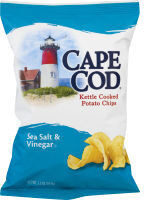Kettle Cooked Potato Chips, Sea Salt & Vinegar - Cape Cod
This product page is not complete. You can help to complete it by editing it and adding more data from the photos we have, or by taking more photos using the app for Android or iPhone/iPad. Thank you!
×
Barcode: 0020685001383 (EAN / EAN-13) 020685001383 (UPC / UPC-A)
Brands: Cape Cod, Cape Cod Potato Chips Inc.
Brand owner: Cape Cod Potato Chips Inc.
Categories: Snacks
Countries where sold: United States
Matching with your preferences
Health
Ingredients
Food processing
Additives
Ingredients analysis
The analysis is based solely on the ingredients listed and does not take into account processing methods.
Nutrition
Serving size:
1 ONZ (28 g)
Environment
Packaging
Transportation
Report a problem
Data sources
Product added on by usda-ndb-import
Last edit of product page on by kiliweb.
Product page also edited by org-database-usda, yuka.sY2b0xO6T85zoF3NwEKvlhxlcsfOoDGZFj7nxUKBwIasHL7URdh4_4X0Yqs.
If the data is incomplete or incorrect, you can complete or correct it by editing this page.







